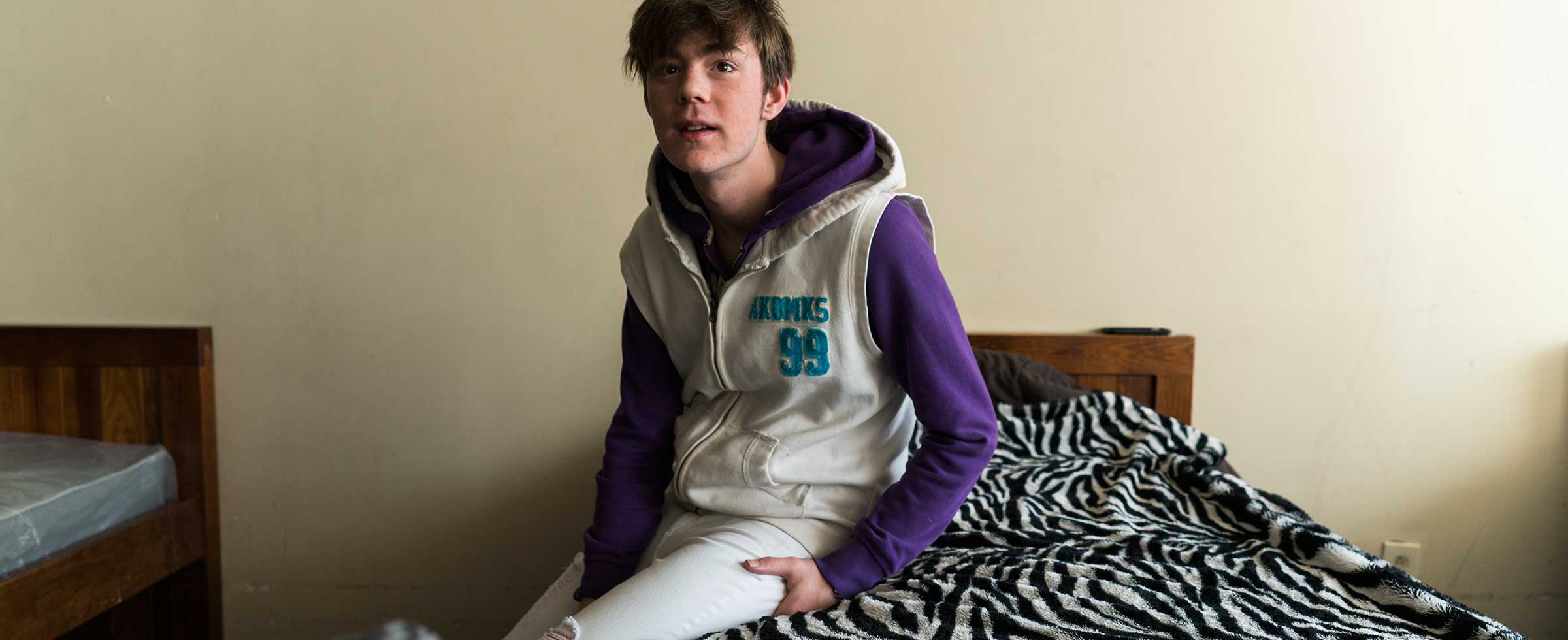
Each year, young men and women ages 18 to 24 arrive at the former carpet store on Fifth Avenue seeking shelter for the night or longer. Lenny Prewitt has seen thousands pass through the Downtown Outreach Center and Shelter (DOCS) in his 22 years with the program. If he’s learned anything, it’s that they’re in need of much more than a temporary place to stay.
More than a third are undereducated. Many are hungry and lack the security of knowing when they’ll eat again. As they enter adulthood, most are poorly equipped for independent living and steady employment. They’re often “stuck in survival mode,” as Prewitt puts it — the situation they’ve been in for most of their lives.
“They’re not coming in with the same background as people who’ve been nurtured, supported and taught. They’ve missed out on a lot,” says Prewitt, senior program manager at the shelter operated by Familylinks, a western Pennsylvania–based human services nonprofit. “They’re dealing with mental health issues, psychological and emotional abuse, physical abuse, sexual abuse. These are damaging traumas that they bring with them to our front door.”
Helping these young men and women make a healthy transition to adulthood and improve their future prospects is one strategy that The Pittsburgh Foundation is pursuing as it directs grantmaking toward “100 Percent Pittsburgh,” a new organizing principle for its work through the rest of this decade: the Foundation will embrace the city’s economic and cultural renaissance while spotlighting the more than 30 percent of residents who have been left out of the “New Pittsburgh.” The Foundation will work to ensure that all people benefit from the region’s revitalization.
An internal examination of data — including a poverty-trends analysis conducted by the Urban Institute and discussions with experts on the front lines of poverty-related issues — led the Foundation to put a particular focus on youth ages 12 to 24 and single women with children. The Urban Institute’s data make a compelling case for doing so, as youth and single mothers are facing the largest increases in poverty over the past 10 years in Allegheny County.
Some 17.5 percent of southwestern Pennsylvania’s children under the age of 18 live in poverty, the U.S. Census Bureau suggests. In Allegheny County, as many as 30 percent of Pittsburgh Public School students have had contact with the child welfare system. Nearly 3,800 children 18 and under were referred to juvenile probation in 2014. The number of female-headed households in the region rose 15 percent from 2000 to 2010.
While quantitative data and research are critical, listening to those who work in the field — as well as to youth who’ve been left out of or let down by the systems designed to support them — has helped refine the Foundation’s approach to grantmaking, says Michael Yonas, senior program officer for Social Innovation, Research and Special Initiatives.
“We have lots of data, but we also want to assess the how and why behind each data point. We are working to engage with organizations and with youth themselves in order to better understand the context and factors affecting their lives. It’s about being purposeful in engaging and working to amplify these voices in the work that we do,” Yonas says.
The Foundation took this approach in awarding Familylinks a recent grant that enabled the nonprofit to add two case-management positions at DOCS, expanding the capacity of the city’s only shelter for young adults. DOCS is now equipped to help teens and young adults with transformative services instead of assistance confined to emergency needs such as a temporary place to sleep.
An estimated 240 young men and women ages 18 to 24 live in shelters or on the street in Allegheny County at any given time, according to officials in the county’s Department of Human Services. A recent federal study suggests that 20 percent of the nation’s youth experiencing a housing crisis have also been physically or sexually abused.
DOCS typically shelters 100 to 120 young men and women each year, and the average length of stay has steadily increased. Often, young people come to DOCS without a clear pathway to stability. In 2014, nearly 73 percent of those who sought shelter were unemployed when they arrived; 37 percent did not have a high school diploma. When Yonas met with young Familylinks clients to better understand their needs, two priorities emerged: young people need to be trained in how to land and keep a job, and they need support in navigating the systems necessary for gaining employment.
Today, these priorities are being addressed in the shelter’s programming. As recently as January, for example, the nonprofit ACTION-Housing Inc. held workshops at the shelter on resume writing, job readiness and job retention, all of which were arranged by DOCS case managers, who are officially known as “engagement specialists.” Two of these positions are funded by the Foundation’s grant.
The specialists now work with youth at the shelter to identify goals related to housing, education and behavioral health, and they guide them in developing work plans for accomplishing these goals. Specialists refer youth to services and track their progress along the way. Another hoped-for result of the interaction is that the shelter’s youth will bond with the specialists and view them as trusted adults that they can turn to for guidance.
“Coming out of rough situations and trying to straighten up and live a clean, healthy lifestyle is not easy,” says Prewitt. “Most of them are just beginning to understand what it’s going to take to live in the adult world. But if we can say that young adults are leaving here in a better position to be self-sufficient than when they came in, then we’re meeting our goals.”
Original story appeared in Forum Quarterly - Spring 2016




